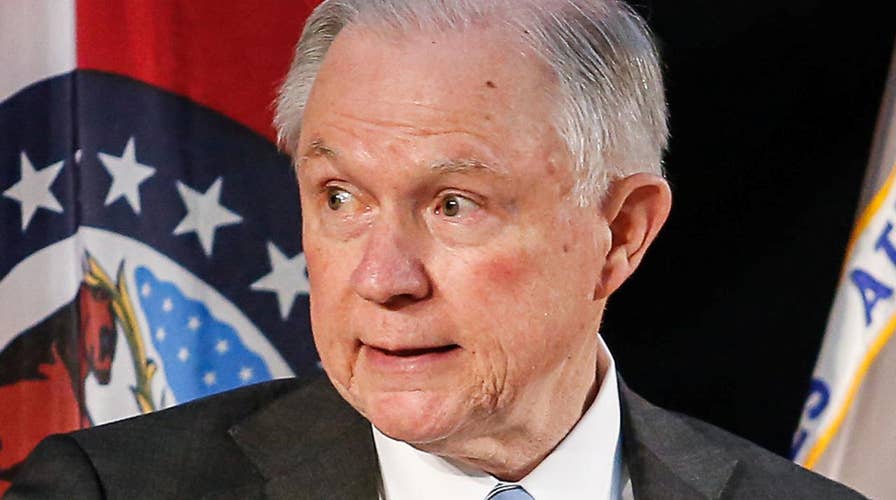Sessions orders DOJ review of Obama-era police agreements
On 'America's Newsroom,' former Boston police chief Ed Davis breaks down move to boost law enforcement morale
Attorney General Jeff Sessions has ordered the Justice Department to review reform agreements the Obama administration made with police departments across the country, in the latest move to boost law enforcement morale and independence.
The new directive, as well as a bid to reconsider an agreement in Baltimore that former President Barack Obama's lawyers made, are signs the Trump administration is planning to scale back the number of investigations into law enforcement misconduct -- and revisit deals negotiated by the prior administration’s civil rights unit.
Sessions' memo demands the Justice Department review all its prior police reform agreements “including collaborative investigations and prosecutions, grant making, technical assistance and training, compliance reviews, existing or contemplated consent decrees, and task force participation in order to ensure that they fully and effectively promote the principles” of the new administration.
Some law enforcement groups are hailing the move, amid recent complaints that restrictions on police have emboldened criminals.
Chuck Canterbury, president of the Fraternal Order of Police – the largest police union in the United States – told Fox News the “FOP approves of any review that will benefit the departments and the men and women of law enforcement.”
“The attorney general’s approach is to assist, not hinder law enforcement, and we support his directive,” he added.
The International Union of Police Associations, which supported Sessions’ confirmation, says they are taking a wait-and-see approach to the review.
Already, though, Sessions' steps are stoking fear and concern in local communities about police departments not having the proper oversight.
Sessions’ memo was released around the same time the department’s civil rights lawyers asked a federal judge to postpone a hearing on a sweeping police reform agreement between the Baltimore Police Department and the Obama administration.
Baltimore Mayor Catherine Pugh and its Police Commissioner Kevin Davis said they were surprised by Sessions’ request for a delay and “strongly” opposed it. Pugh and Davis worked with the Obama administration and reached an agreement meant to repair public trust in the police and curb violence.
“Much has been done to begin the process of building faith between the police department and the community it seeks to serve,” Pugh said in a statement. “Any interruption in moving forward may have the effect of eroding the trust that we are working hard to establish.”
Like in Baltimore, the DOJ has negotiated multiple formal reform agreements with cities called “consent decrees” which are overseen by a federal court.
There were consent decrees with 14 departments under the Obama administration.
In the past, Sessions has expressed skepticism about the role the federal government should have in local law enforcement accountability and has said it’s unfair to criticize police department cultures.
Sessions argued in his two-page memo while “local control and local accountability are necessary for effective policing, it is not the responsibility of the federal government to manage non-federal law enforcement agencies.”
During his Senate confirmation hearing, Sessions said there is “concern that good police officers and good departments can be sued by the Department of Justice when you just have individuals within a department that have done wrong.”
He also said the lawsuits “undermine the respect for police officers and create an impression that the entire department is not doing their work consistent with fidelity to law and fairness, and we need to be careful before we do that.”
Under Obama, the DOJ opened investigations into more than two dozen police agencies including Baltimore, Ferguson, Mo., Cleveland and Seattle.
Most of the police incidents investigated by the Obama administration uncovered patterns of abuse and racial discrimination.
Vanita Gupta, who ran the civil rights division under Obama, told The Associated Press the request for a delay is “alarming and signals a retreat from the Justice Department’s commitment to civil rights and public safety in Baltimore.”
In Chicago, Mayor Rahm Emanuel and Police Chief Eddie Johnson issued a joint statement pledging to continue to work on their existing plans to reform abuses in the city’s police department.
“Reform is in our self-interest and that is why Chicago has been, is, and always will be committed to reform,” the statement read.
Chicago was the subject of a scathing Justice Department report in January.
Then-Attorney General Loretta Lynch said Chicago police had repeatedly violated the Fourth Amendment through a “pattern or practice of use of excessive force.”





